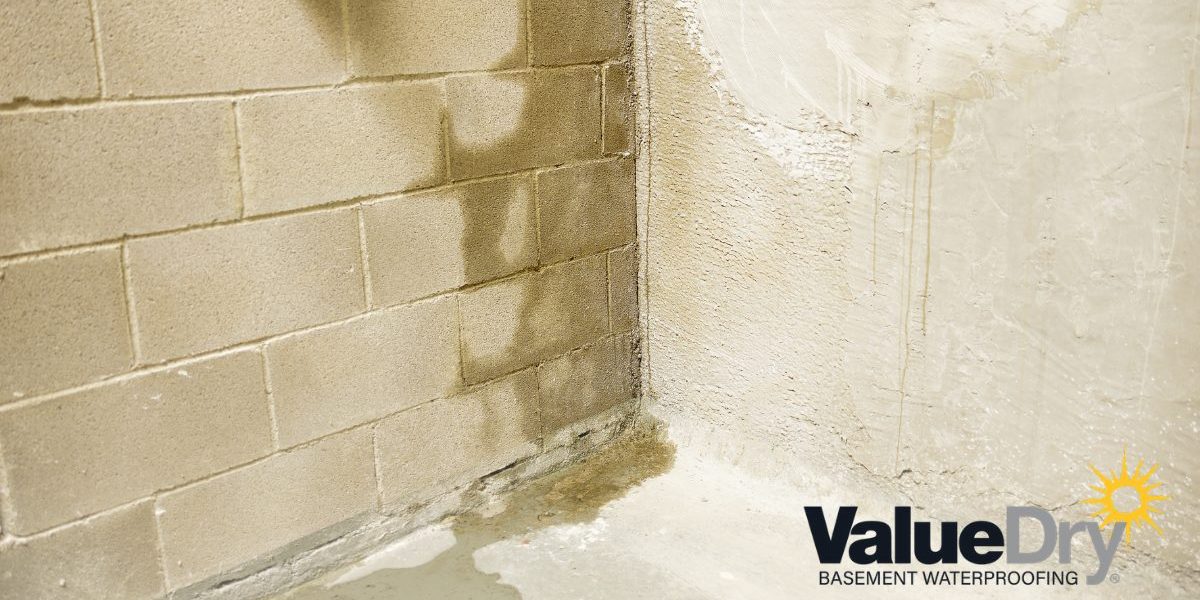Top Signs You Need Basement Waterproofing
- April 13, 2021
- No Comments
We’ve all heard the saying “April Showers Bring May Flowers,” but April showers can bring something not quite so pleasant – a wet basement, or worse, a flooded basement. At Value Dry Waterproofing, the spring and late summer months are frequently the busiest. That makes sense because that’s when the Mid-Atlantic area usually gets the most rain. It’s a good idea to check out your basement during and after any rain to make sure your home is dry, safe, and healthy. Some signs you need basement waterproofing services are more obvious than others, but here are some things to look (and smell) for:
Puddles of Water
Puddles of water, standing water, or a trickle of water are all signs of water intrusion. But before you panic, make sure the water is not from a leaky water heater, washing machine, or burst pipe like a hose bib. If you rule all of those out, you have a foundation seepage problem that basement waterproofing can help solve.
Be on the lookout for water stains on the walls or floor as well. If you don’t get down to the basement often, or you just bought a house, stains can be an indicator of water intrusion.
Efflorescence
Efflorescence is a big word that describes the dried salt crystals that are left behind on basement walls when water evaporates. It can look chalky white, and may sparkle when the lights are out. Efflorescence is most commonly visible on cement block foundations due to the hollow core of the cinder block filling up with water then evaporating over time.
Groundwater that soaks into concrete or cement block basement walls or concrete floors is the main cause of efflorescence. It’s more than a cosmetic issue – it’s a sign of water intrusion that you should not ignore.
Bowed Basement Walls
If your basement walls are bowing, you have a serious water intrusion problem, and potentially, a serious structural issue. You should call professionals right away if you notice this. Hydrostatic pressure from the groundwater outside your foundation walls is to blame and the walls may be in danger of collapse. Another sign of bowing foundation walls is experienced when interior doors become difficult to open and close.
Cracked Basement Walls or Floor
Cracks in your basement walls or floor may be harder to see if you have a finished basement with drywall and carpeting, but even if your basement is finished, there may be a utility room where your furnace is located. Check there for cracks.
The swelling and shrinking of clay soil can cause vertical, horizontal, and stairstep cracks in your walls and floor that can grow larger with time. This in turn allows water intrusion. If you see these cracks, you should schedule an inspection with a basement waterproofing company.
A Musty Smell
When you walk down to the basement, do you immediately notice a damp, musty smell? That’s another sign you may have water intrusion issues. Musty odors don’t develop overnight. The smell is a sign of a long-standing issue. Even if you don’t see water, it’s there. It has soaked into any material that it can.
If you have a finished basement, you may notice the carpet seems damp or the drywall is damp. You may need to tear out these materials to get to the source of the problem. If you have an unfinished basement, there may be condensation on the walls.
Mold Growth
Mold growth is a clear sign of a wet basement that needs help, and fast. Mold can take hold very quickly after basement flooding, and can also result from long-term water intrusion. You may see visible mold growth on cardboard boxes you have stored in the basement, or on other surfaces.
Mold growth could be the result of a plumbing leak, but is often a sign that you need basement waterproofing.
Respiratory Problems That Won’t Go Away
If your whole family seems to have had respiratory symptoms for months, but the doctors can’t tell you that you have an infection, it could be due to mold in your home. And again, water intrusion in your basement is the most common reason for mold to grow. The spores are then sent through your home via your HVAC system. This can result in allergy-like symptoms, including:
- Red or itchy eyes
- Sneezing and coughing
- Headaches
- Skin rashes
- Wheezing
A basement inspection can detect water intrusion and mold issues. This is often the best thing you can do to get moving towards a dry basement and a healthy home.
Schedule a FREE Basement Inspection
If you have a wet basement and any of the signs above, you should consider hiring a basement waterproofing contractor sooner rather than later. At Value Dry Waterproofing, we are licensed and insured, and we have inspected more than 100,000 homes.
We offer a FREE basement inspection to homeowners throughout Maryland, DC, northern Virginia, West Virginia and Southern Delaware. Don’t wait for the problem to get worse. Schedule an inspection today.
RELATED READING:
How to Choose a Basement Waterproofing Contractor
Types of Foundation Cracks and What They Mean


